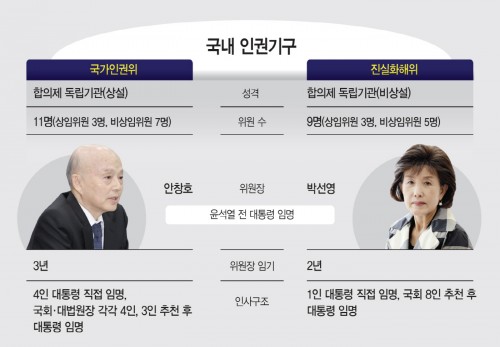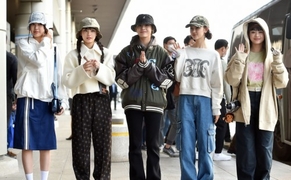 |
As Korea’s independent rights institutions grapple with mounting accusations of political bias, critics warn there are virtually no mechanisms to keep them in check.
Controversial political remarks by the heads and members of the National Human Rights Commission of Korea (NHRCK) and the Truth and Reconciliation Commission (TRC) are under fire. External intervention is limited in the name of “independence.” Each body is governed by its own statute, with no explicit grounds for dismissal or removal. Calls are growing for transparent appointments and stronger civic oversight. Tasked with “safeguarding human rights,” the leadership of these independent bodies has shown open partisan leanings and, at times, overt hate speech, casting a pall over the institutions they lead. Observers say the absence of guardrails—justified as necessary for independence—has left little room for corrective action. Many now argue that personnel reforms and civic-sector oversight are urgently needed to restore their role as a “last bulwark” for rights.
The NHRCK and the TRC investigate and establish facts about human-rights violations in the present and the past, respectively, and issue opinions or recommendations. Both are collegial independent bodies founded by separate statutes and are not embedded in the legislative, executive, or judicial branches.
Unlike other collegial commissions housed under the president or prime minister—such as the Broadcasting, Media and Communications Commission or the Anti-Corruption and Civil Rights Commission—these bodies are not subject to external supervision, and their chairs and members are not subject to impeachment. Because they handle rights issues, they are expected to avoid political bias and speak truth to all branches of power under a strong guarantee of independence.
Recently, however, “independence” appears to have turned into a liability. Current NHRCK Chair Ahn Chang-ho and TRC Chair Park Sun-young were appointed by former Presiden Yoon Suk Yeol in September and December of last year, respectively.
Both appointments went ahead despite controversies—“hate speech against minorities” in Ahn’s case and “defense of martial law” in Park’s. After taking office, Ahn repeatedly made misogynistic and anti-LGBT remarks to staff, while Park fueled backlash by saying of the May 18 Democratization Movement that “there is still debate over North Korean military involvement.”
Institutional neutrality has frayed as a result. After the December 3 declaration of martial law, the NHRCK stayed silent on alleged rights violations against citizens while urging protection of former President Yoon’s right to defense. Last month, it also approved site visits to Seoul Detention Center—where former President Yoon and other suspects in the three special counsel probes are held—under the pretext of a “pre-trial detainees’ rights survey.” The TRC, for its part, halted investigations in 2,116 cases as of May last year; with about 65% involving mass killings by past military or police authorities, critics say political bias likely influenced the decision.
Despite the continuing uproar, there have been no apologies or corrective steps. Once appointed, there are virtually no checks. The chairs and commissioners are not subject to impeachment, and current law specifies no grounds for dismissal or removal. Barring detention, they serve out two- to three-year terms.
Proposals now focus on after-the-fact checks and more transparent appointments. Ideas include creating an independent “candidate recommendation committee” with civic participation and writing explicit grounds for dismissal or removal into law. By the count of the 22nd National Assembly, 16 related amendment bills have been introduced.
“A confirmation hearing is only advisory, leaving the final say to the president,” said a political insider. “We need an independent candidate recommendation committee that strengthens civic-sector oversight.”
Most Read
-
1
-
2
-
3
-
4
-
5
-
6
-
7





















